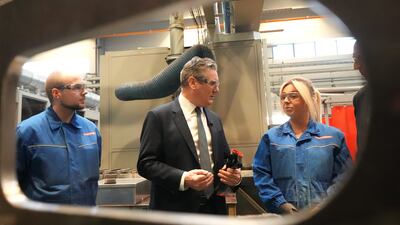UK Labour’s manifesto pledges indicate the party can be trusted to “stick to serious defence policy”, the former head of the UK's intelligence, security and cyber agency, GCHQ has said.
Sir David Omand praised several commitments in the party’s plans, including a commitment to spend 2.5 per cent of GDP on defence as soon as possible and the continuing support of Ukraine against Russia.
Writing in The Telegraph, he added: “Labour's announcement of a 'triple lock' on our nuclear deterrent indicates that we can in future trust the party to stick to serious defence policy.”
Labour has pledged to maintain Britain's continuous-at-sea nuclear deterrent, deliver the new ballistic submarines being built at Barrow-in-Furness, north-west England, and provide all upgrades needed to keep the deterrent going.
Sir David, who led GCHQ between 1996 and 1997 before becoming permanent secretary at the Home Office and then UK security and intelligence co-ordinator, contrasted the policy with earlier decisions to delay building new submarines.
He criticised David Cameron's decision as prime minister to delay the order for new submarines, saying he had ignored “the increasingly intense warnings of his chief of defence and senior civil servants”.
In 2010, the government under Lord Cameron, now Foreign Secretary, decided to delay replacing the submarines by up to five years, prolonging the life of the Vanguard-class submarines first launched in 1992.
Sir David added: “The inevitable result was a long and very costly refit for the oldest of the current fleet, HMS Vanguard, which had to include an unplanned refuelling of her nuclear reactor.
“This has meant unnecessary expenditure of hundreds of millions of pounds, as well as great strain on our submariners and their families. This was completely avoidable.”
He also praised Labour's plans to decarbonise the electricity grid by 2030, saying he did not want to see the UK “beholden to fossil fuel autocrats”.
Labour's pledges mark a departure from the party's approach to defence under previous leader, Jeremy Corbyn, who was critical of Nato and a supporter of the anti-nukes Campaign for Nuclear Disarmament, voting against the renewal of Trident in 2016.
Prime Minister Rishi Sunak has claimed that Labour is a threat to national security, saying shortly before he called the election that Keir Starmer’s actions demonstrated he would not be able to keep the country safe.
On Monday, he told reporters the Labour leader did not have “the courage of his convictions”, adding he was “not prioritising investment in our country's security”.
The Conservatives have also pledged to raise defence spending to 2.5 per cent of GDP, saying they will hit this target by 2030.
Labour has not put a timeframe on its promise.


